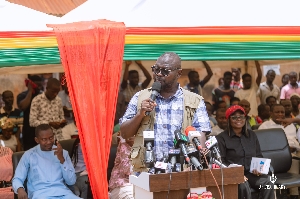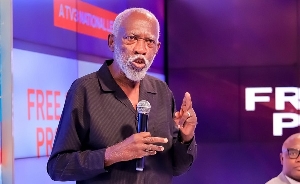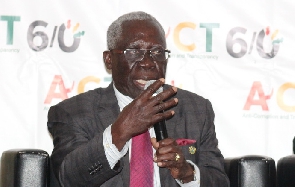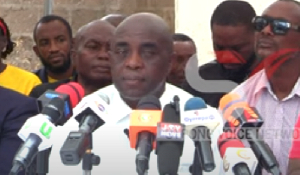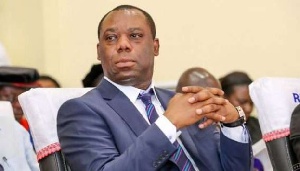 Education Minister, Matthew Opoku Prempeh
Education Minister, Matthew Opoku Prempeh
Public sector teachers may have heaved a sigh of relief when President Addo Dankwa Akufo- Addo announced a planned 10% increase in their basic salaries later, this year.
Aside the anticipated increase, the government has also started clearing arrears owed teachers as far as 2013 to 2016, with respect to travel, transfer grants and overtime. President Akufo- Addo announced the package when he commissioned the refurbished hall and hostel at the teachers’ hall last week.
He further announced that the government was working with other stakeholders to develop a comprehensive teacher policy based on UNESCO benchmarks to enhance the working conditions and productivity of teachers.
UNESCO benchmark
The 2015 Education for All Global Monitoring Report was expected to review how much the Education for All (EFA) Movement has contributed to ensuring that all children, young people and adults enjoy their right to an
education that meets their basic learning needs. One clear lesson from the past 15 years is that governments need a better framework for financing progress towards international education goals.
Over the years, two international benchmarks of spending on education have been established. The first sets a target of spending 20% of total government budgets on all levels of education. The second widely accepted goal for education is to spend 6% of GNP on education. As the world moves forward in deciding on the new post-2015 framework, the Muscat global education goals, agreed in Oman in May 2014, have set an ambitious new agenda for education, which will both inform the Sustainable Development Goals.
In particular, the 2015 Global Monitoring Report (GMR) recommended that financial resources be made available to education, taking into account the roles of governments, international development institutions, households and the private sector.
Most importantly UNESCO and other stakeholders recognised that improving the motivation and status of teachers generally improves teaching. Research suggests that students learn more in classrooms with highly dedicated and motivated teachers. For that reason, raising the motivation and status of teachers, as well as retaining high-quality teachers is vital to improving education.
According to UNESCO, in many educations systems student learning suffers due to difficulties attracting high-quality teachers, limited motivation for teachers to perform their jobs well, and teacher attrition. UNESCO notes that, though well intentioned, some educational policies and programmes actually undermine teacher motivation. Education planners should therefore carefully consider the impact of their decisions on teachers and their motivations to teach.
It has been proved in many contexts that, exemplary teachers are highly motivated to teach their students well. However, a variety of intrinsic factors (such as loving the teaching process) and extrinsic factors (such as salary, further education) influence teachers’ motivation levels. On the contrary low teacher motivation can affect the quality of candidates entering the profession. It can also contribute to a reduced focus on the teaching and learning process as evidenced by minimal time spent preparing lessons or supporting struggling learners.
Consultation
The President’s announcements came on the heels of agitations by teacher unions of lack of adequate consultation in the rollout of the free SHS policy and its offshoot-the double track system. Teachers and their unions have also been complaining about the demotivating conditions of service under previous administrations.
Thus, the anticipation of an improvement in their working conditions heralded the change of government in 2016. Fresh in office, the current government faced myriads of challenges in the education sector; chief among them being salary increases, salary arrears of newly employed teachers, failure to pay arrears of transfer allowances, promotion allowances, scraping of the teacher-trainee allowances, and failure to clear the backlog of teachers waiting to be employed for over three years.
See Also: How collective waste management can prevent perennial floods
Many teachers are weighing these problems against the government’s manifesto promise of ‘teacher first policy.’ So, far has the government met the expectations of the various stakeholders in education delivery?
In honesty, a review of the problems in the education sector and the government’s response this far, gives indication that government is committed to improved education-its accessibility, affordability and quality. Some however, argue that the area of lesson preparation and lesson delivery (with teachers at the centre) needs equal attention.
As part of my contribution towards the successful implementation of the Free SHS policy, and other educational interventions, I have interacted with some secondary school teachers across the country; in a bid to collate their views on the new intervention.
The dominant concern of many of the teachers I spoke to, had to do with motivation- teachers’ salary, allowances and non-tangible incentives like adequate consultation before new interventions are introduced. Some of the teachers insisted that the government should have broadly consulted key stakeholders. The other issue close to their heart is the non-payment of various allowances due them in the past. In their view, they are supposed to have equal treatment with their counterparts at the tertiary institutions, since they also undertake research to enhance teaching and learning.
On the issue of workload, some of them argue that, an average teacher manages 300 students, which should have come with the commensurate allowances. In times of emergency, the housemasters use their own resources to take students to hospital but get nothing in return; safe insults from some parents when things go wrong.
Citing the case of the current form one students, who were admitted with aggregate 40 and above, the teachers argue that, they need to spend extra time and efforts in teaching to bring them up to scale. Besides, the huge numbers of students, say a class of 50-60 is daunting task, which could hamper proper supervision and monitoring. Faced with such a task, it is obviously difficult for teachers to give assignments, let alone marking and doing proper assessment. Therefore, unless teachers are motivated to work beyond the call of duty, quality could be compromised. This is more serious for core subject teachers, as all students study core subjects.
Undoubtedly, heavy workloads and large class sizes can significantly demoralize teachers. Teaching is also becoming more challenging due to increased demands to teach complex skills. Besides, personal discomfort may make teachers want to leave their teaching post or even the profession. Inadequate housing options, as well as the cost and travel time for transportation can contribute to low motivation and increased attrition
Double track system
As was expected, some teachers said the introduction of the double-track policy should have been accompanied by a motivation package for teaching and non-teaching auxiliary staff. The package would have compelled them to give off their best. As things, stand now, according to them, they are being used for triple work for the same salary. Another concern raised by the teachers had to do with the capacity of the new graduate teachers posted to some secondary schools. They claim some of the new teachers are teaching subjects they are not qualified to teach. This is perhaps, a case of putting square pegs in round holes, just to make up the numbers, they argued. Unless addressed urgently, this has dire consequences for overall student performance.
The text book policy also came up during my interviews. One teacher explained that formerly core and elective textbooks were supplied by Ministry of Education, and students retuned them after completing school. However, with the current policy the Ministry of Education and the Ghana Education Service only supply core textbooks, with the expectation that parents would provide the elective textbooks. But many parents have failed to provide the elective textbooks, leaving their wards with nothing to study. What’s more, students are being requested to return the core textbooks at the end of the academic year. This makes it difficult for the students to study on their won, when teachers fail to teach some topics. They suggested that the Ministry of Education and its agencies should sensititize parents and caregivers to understand they have a shared responsibility to complement government efforts.
PTA dues
The recent suspension of all Parent-Teacher Association (PTA) levies across the country is a cause of anxiety among school administrations. In their view, the government should not downplay the critical developmental roles the PTAs currently play at schools. In many schools, PTAs are a complementary source of funding for the schools, without which many schools would have collapsed.
In most of the schools, auxiliary staff like nurses, security, cleaners etc are paid through PTA dues. Thus, the PTAs have become the lifeblood of many schools. This is why heads of schools are advocating for the government to grant PTAs autonomy to collect approved levies for infrastructure development at schools. This would bridge the gap between endowed and less endowed schools, and hopefully lift the small schools to the level of the big schools. For instance, a school like Ghana National College lacks an assemble hall, and while the Ministry of Education is yet to provide one, parents can be prevailed upon to contribute towards its construction. Many parents are proud to be associated with the developmental needs of the schools their children are enrolled and should be encouraged to contribute according to their capacities.
Moving forward
The general views among the teachers is that there should be a comprehensive assessment of the Free SHS policy. An assessment is even more pressing with the introduction of the double tracking system; though news is spreading that government intends to stop doubt track by September 2019. An assessment could raise the need for the exemption of more schools from double track. One suggestion is that students admitted to the endowed schools could be made to pay school fees. Some of the fees could be channeled into developing the less endowed schools. This could be the case of taxing the rich to improve the conditions of the poor. This fiscal policy has been used in many countries, in diverse circumstances to attain specific development goals.
The teachers urged the Ministry of Education and the Ghana Education Service to take a second look at the current system of high as aggregate such as 40. If the wholesale admissions continue, BECE candidates will not be challenged to pursue excellence. One teacher suggested that there could be a cutoff aggregate to instill the spirit of competition in our children. “The children must embrace the fact that the world is a world of competition”, the teacher said.
While commending government for revamping technical and vocational institutions (TVETs), the teachers noted that the TVET system is still plagued with myriads of problems that need to be fixed, if the country is to reap the full benefits of TVET.
In sum, the general view is that, the ongoing system should be improved, if the country is to derive the intended benefits in medium to long term. Moving forward, equal attention should be paid to teacher motivation, provision of teaching and learning materials





